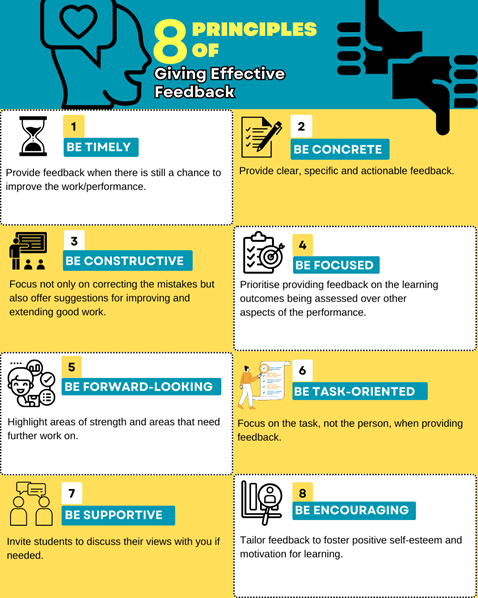
How important is feedback?
Feedback has a significant impact on students’ learning. It aims to:
- Recognise and acknowledge specific qualities in student work
- Provide constructive guidance for students on how to improve their academic performance/ standards
- Enhance students’ ability to monitor and evaluate their own learning
- Clarify/elaborate on how students gain/lose marks on each criterion of the assessment rubrics
Click/tap here for principles of giving effective feedback (Appendix C)
Click/tap here for giving feedback at different stages of an assessment (Appendix D)
References
- Adie, L., & Klenowski, V. (2016). Moderation and Assessment. In Peters, Michael A. (Ed.) Encyclopedia of Educational Philosophy and Theory. Springer.
- Baird, J. A., Greatorex, J., & Bell, J. F. (2004). What makes marking reliable? Experiments with UK examinations. Assessment in education: Principles, policy & practice, 11(3), 331–348.
- Beaumont, C., O’Doherty, M., & Shannon, L. (2011). Reconceptualising assessment feedback: A key to improving student learning? Studies in Higher Education, 36(6), 671–687. https://doi.org/10.1080/03075071003731135
- Crimmins, G., Nash, G., Oprescu, F., Alla, K., Brock, G., Hickson-Jamieson, B., & Noakes, C. (2016). Can a systematic assessment moderation process assure the quality and integrity of assessment practice while supporting the professional development of casual academics? Assessment & Evaluation in Higher Education, 41(3), 427-441. https://doi.org/10.1080/02602938.2015.1017754
- Monash University. (2023). Assessment: Marking and Grading. Learning and Teaching: Teach HQ. https://www.monash.edu/learning-teaching/TeachHQ/Assessment/marking-and-grading
- Ragupathi, K., & Lee, A. (2020). Beyond fairness and consistency in grading: The role of rubrics in higher education. Diversity and inclusion in global higher education: Lessons from across Asia, 73-95.
- Sadler, D. R. (2010). Fidelity as a precondition for integrity in grading academic achievement. Assessment & Evaluation in Higher Education, 35(6), 727–743. https://doi.org/10.1080/02602930902977756
- University of New South Wales. (2023). Giving Assessment Feedback. Teaching Practice. https://www.teaching.unsw.edu.au/assessment-feedback
- Zahra, D., Robinson, I., Roberts, M., Coombes, L., Cockerill, J., & Burr, S. (2017). Rigour in moderation processes is more important than the choice of method. Assessment & Evaluation in Higher Education, 42(7), 1159–1167. https://doi.org/10.1080/02602938.2016.1236183
Contact

Dr Dawn Lo, dawn-fy.lo@polyu.edu.hk,  2766 5575
2766 5575
Leo Chon, leo-wy.chon@polyu.edu.hk,  3400 2372
3400 2372


